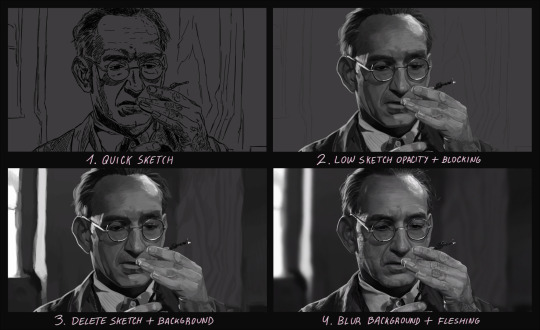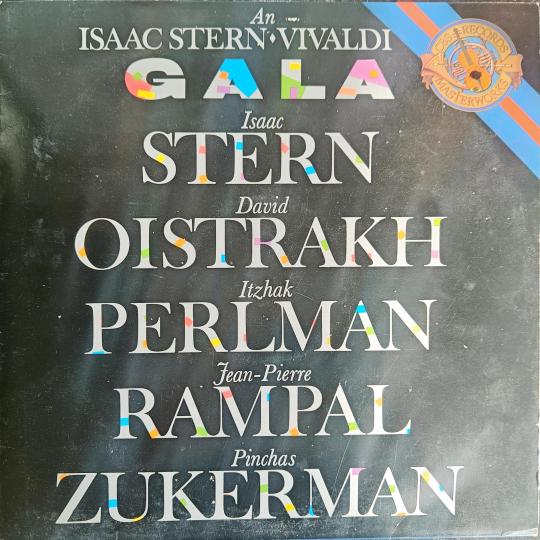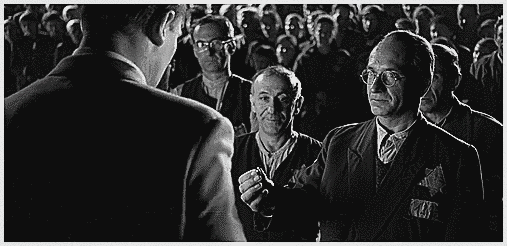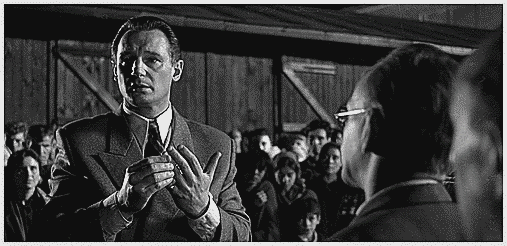#itzhak stern
Explore tagged Tumblr posts
Text


I was watching Schindler's List (one of my favorite movies 💖), when I had to stop the movie to take care of some business. When I came back, I noticed that I had paused it at the moment where Oskar Schindler gives his gold watch to Itzhak Stern for him to use as a bribe in order to get an elderly couple (the Perlmans) added to the list. 📝✍
This isn't only a pivotal moment in the film (and in the true story that inspired it as well 🕯️), but it also involves my favorite character (Itzhak Stern, played masterfully by Sir Ben Kingsley 👏), and some exquisite cinematography (just look at that camera work and lighting! 🎥✨) that inspired me to try to paint it in my beloved Paint Tool SAI. 🖌️
The painting took about 50 hours and was done with 1 medium/large flat brush, 1 small round/bristle brush (both with chalk texture to make them look more realistic and less "digital" 😉), and 1 very large water/blur brush (which was only used for the background, as I didn't want to blur the character so that the painting would look more traditional and less "photographic" than some of my previous works 👀).
The hardest part to paint was Itzhak's forehead and, to my great surprise, the easiest was the glasses! Which surprised me since it's the first time I've painted a realistic portrait of someone wearing them, haha. 👓🤭
#schindler's list#itzhak stern#ben kingsley#my art#no ai used#my wips#artists on tumblr#support human artists#realistic art#digital art#paint tool sai#tutorial#step by step#digital painting#hyperrealism#hyperrealistic#realistic portrait#realistic paintings#human artist
5 notes
·
View notes
Text
Let’s talk about the movie “Schindler list”
Release date; February 4, 1994
Rating: ★ ★ ★ ★ 4.5
Directed by Steven Spielberg won his first Academy Awards for Best Picture and Best Director with Schindler's List
Casting (Important Characters in the movie)
Liam Nelson as Oskar Schindler
Ben Kingsley as Itzhak Stern
Ralph Fiennes as Amon Goeth
Caroline Goodall as Emilie Schindler
The film's black-and-white cinematography, coupled with its haunting score, creates an atmosphere of solemnity and authenticity. The performances by Liam Neeson as Schindler, Ralph Fiennes as the sadistic Amon Goeth, and the entire ensemble cast are exceptional, bringing a depth and rawness that makes the characters feel vividly real.
Tackles the darkest chapter in human history with unwavering honesty and sensitivity. It explores themes of heroism, sacrifice, and the moral complexities of a world torn apart by hatred. The film not only depicts the horrors of the Holocaust but also highlights the moments of compassion and humanity that can emerge even in the midst of such darkness.
Spielberg's direction is masterful, capturing both the immense scale of the tragedy and the intimate stories of the individuals affected by it. The film's attention to detail and historical accuracy add to its impact, making it an invaluable historical document.
What does the girl in the red coat mean in the movie?
His image with a red coat in Schindler's List has become over the years a symbol of hope in the midst of a very hard and cruel reality.
But what makes "Schindler's List" so much more than just a well-crafted movie is its powerful message of compassion and umanity in the face-of unimaginable evil. By shining a light on the darkest chapter in uman history, Spielberg forces us to confront our own capacity for cruelty and forces is to question what we are willing to do to stand up for what is right.
In conclusion, "Schindler's List" is an extraordinary cinematic achievement that goes beyond entertainment. It is a visceral, emotional journey that confronts the depths of human depravity while also celebrating acts of selfless heroism. The film's impact extends far beyond its runtime, leaving an indelible mark on the viewer's consciousness and reaffirming the power of cinema to provoke thought and inspire change.
I recommend, a fucking masterpiece.
Pd: written by Martina
3 notes
·
View notes
Text
Quotes
Whoever saves one life saves the world entire. "Schindler's List"
In one of the 1993 movie’s final and most heartrending scenes, Itzhak Stern (Ben Kingsley) presents Schindler (Liam Neeson) with an engraved gold ring, explaining that it bears the line above — a quotation from the Talmud, the book of Jewish law. Oskar Schindler saved around 1,200 Jews during the Holocaust.
3 notes
·
View notes
Text
Musings on Munich as a Spielberg Film, in Contrast to Other Spielberg Films

Munich remains an incredibly powerful movie about the way that violence begets violence and the way that never ending cycle destroys souls. It's sadly even more relevant today than it was in the post-9/11 world Spielberg made it in.
I've thought a lot about some of Spielberg's other history-based films like Amistad and Schindler's List, and the way that those movies, as bleak as they are and as much as they are about horrible things, are, in the end, rather hopeful because of the way they look at people who did what they could, and even though what they could do would ultimately be a drop in the bucket when you consider the scope of the horrors and atrocities, they still allow for that hope and comfort because there really is something to be said about the idea that as long as there are people who are doing what they can, there is still hope.
Munich is like... so exactly the opposite of that. I feel like there's not an ounce of hope in this one. Avner and his team aren't framed as the heroes who did what little they could to limit the horror. They're framed as only just contributing to the horror, having been sold an impossible fantasy about what their actions could do and mean by a government that, like so many governments, has decided that brute force is the only path forward. The more the movie goes on the more clear it is that what they're doing isn't saving lives, that it's just contributing to a never ending cycle that can only breed more and worse violence, and that results in them either dying or irreparably damaging their souls.
At the end of Schindler's List there's that scene where the people Schindler saved gather to thank him, Schindler breaks down saying he could have done more, and Itzhak Stern says "you did so much". That scene is very much about praising the idea of doing what you can, that even if it is a drop in the bucket, those are actual lives saved, actual people whose lives were changed for the better because of what he did. It stands in such stark contrast to a scene in Munich where Avner returns to Israel and he's greeted by two soldiers who thank him for what he's done. The framing here is so completely different. Avner has been broken by the job he was tasked with, and he's started to doubt not just whether the violent response was the right thing, but even whether or not the men he killed even deserved it, questioning the government's claims of having evidence of their involvement. Receiving praise for what he did does not feel like a moment of hope. It's a painful moment, watching him being praised for something her clearly regrets, and for something that clearly has not made things any better.
I think one of the most important ideas in Schindler's List is that lives matter. That even though the amount of people he saved is an incredibly small percentage among the millions that were killed and the horrific atrocities committed, what he did still matters because those lives matter. Every life matters, and the people who recognize that and act accordingly can have a tremendous, profound impact, regardless of how big or small what they're able to accomplish may seem. Munich looks at things from the other side. With Munich we're in a world of government entities, of states, of organizations that are willing to put so many innocent lives at risk, that are willing to allow so many innocent people to die, that are willing to contribute to making the world more and more violent and unsafe, condemning the generations of their children, and their children's children, and so on, to lives steeped in increasing, never ending violence and chaos, all in order to continue their campaigns of hatred and attempts at dominance. All while insisting that it's just about survival, that it's just about doing what was done to them, that they have to do it because of what their enemies have done to them. They blur the innocent people who are killed or whose lives are destroyed together as necessary collateral damage, even those who come from their country, who they insist they're doing it all for. On this side of things, every life doesn't matter. Because violence doesn't just beget violence, it also seeps into the bones of these governments and organizations, and the people with power within them. Just as we see the way the violence of the job is destroying Avner throughout the movie, we also see the way it's destroyed the soul of the country and those in charge of it, as their responses to the increasing violence in the world, the increasing amounts of innocent people killed, that they've contributed to and helped to foster, is little more than a shrug and a continued insistence that it's worth it because of the perceived importance of their goal.
Now, to be clear, I am not criticizing Spielberg's more hope-based historical films. Something like Schindler's List and Amistad are about very different things, and in my opinion the ideas in which hope is placed in those movies is very much where the hope should be placed. Because in times of horror and violence, it often isn't going to be the governments or the people with global power who help the people who need it in meaningful, tangible ways. It's going to be the people willing to do what they can, however little that might be. But Munich is about something different. It's about the inherent flaws of using violence as diplomacy, the way that using violence against people teaches them to be violent, the way normal people who want to do good, who want to do what they can, can be manipulated by people and organizations with power that they trust, and about how that violence they're made to do can destroy and disillusion them.
I think the tragedy that Munich focuses on is that, for the most part, Avner and his team are the normal people who want to do good by doing what they can. Avner isn't some master spy assassin. Their bombmaker isn't a bombmaker by trade, he's a toymaker who was trained in disassembling bombs. In a different situation, these people could have been the heroes who inspired hope by doing what they could. But in their grief, their trust in their government, and perhaps their naivete, their desire to help, to do good, to save the lives of their people were taken by their government and pointed in the wrong direction, in a direction that only contributed to the further worsening of the violence in the world, and that really ultimately only ended in their own destruction.
But I don't think that Munich is like, a wildly different entity than something like Schindler's List. Rather, I think they're more two sides of the same coin. They tell stories of similar worlds, similar horrors, but different aspects of those horrors. Or rather, they tell stories of the same world, just a few decades apart, and in a way we're almost seeing the cause in one and the effect in the other. And really, I think one of the points Munich makes becomes even clearer when you take it alongside Schindlers List: that any kind of finger pointing arguments about which side started the violence are ultimately pretty pointless, because the violence has almost always been here. It doesn't just pop up fully formed out of nowhere. In our world, on this planet, acts of violence, particularly those committed by states, are usually just further links in a long, long, long chain of cause and effect that's unlikely to ever end as long as the human race exists. And if anything, that's what makes movies like Schindler's List and the subjects they're about so important.
1 note
·
View note
Note
… to quote itzhak stern, "they put up all the money. i do all the work. what, if you don't mind my asking, would you do?" //
Preparing an idea is what I, myself, do when I react to somebody’s post. That’s just basic etiquette.
When I’m on the other side of it? I already put a lot of thought into writing out my wanted connections, shortened my character’s profile, then put them into a coherent blurb in the reacts channel. The least you can do is READ it and decide what character and basic idea you’re gonna throw at me, so I can expand on it. I would obviously then start the thread.
“I need everything!” Does. Not. Count.
Jesus. No wonder the rpc is rotted. You people think a two-way street means clicking a button does fuck-all. Sorry that I want us both to use actual brain cells.
~
1 note
·
View note
Text
Schindler'in Listesi Filmi Itzhak Stern Kimdir?
Itzhak Stern, Oskar Schindler’in Listesi filminde Ben Kingsley tarafından canlandırılan kurgusal bir karakter olmakla birlikte, gerçek bir kişiye dayanmaktadır. Gerçek Itzhak Stern, Schindler’in fabrikasında çalışan bir muhasebeci ve Schindler’in sağ koluydu. Filmdeki Itzhak Stern’in Özellikleri: Zeki ve Becerikli: Stern, Schindler’in fabrikasının yönetiminde önemli bir rol oynar. Muhasebe…

View On WordPress
0 notes
Text
Schindler'in Listesi Filmi Itzhak Stern Kimdir?
Itzhak Stern, Oskar Schindler’in Listesi filminde Ben Kingsley tarafından canlandırılan kurgusal bir karakter olmakla birlikte, gerçek bir kişiye dayanmaktadır. Gerçek Itzhak Stern, Schindler’in fabrikasında çalışan bir muhasebeci ve Schindler’in sağ koluydu. Filmdeki Itzhak Stern’in Özellikleri: Zeki ve Becerikli: Stern, Schindler’in fabrikasının yönetiminde önemli bir rol oynar. Muhasebe…

View On WordPress
0 notes
Text

Isaac Stern, Vivaldi*, David Oistrakh*, Itzhak Perlman, Jean-Pierre Rampal, Pinchas Zukerman - An Isaac Stern • Vivaldi Gala (1983)
CBS Masterworks CBS 74119 (FRA)
VG+/VG+ (3)
0 notes
Photo

Schindler’s List Cast with director Steven Spielberg
#Steven Spielberg#schindler's list#cast#director#actors#Liam Neeson#Oskar Schindler#Ralph Fiennes#Amon Goeth#Ben Kingsley#Itzhak Stern#American historical drama film#black and white photography#photography#1993#90's#90s#90's classic movies#classic movies#WWII#WW II
210 notes
·
View notes
Photo





Liam Neeson (as Oskar Schindler) Ben Kingsley (as Itzhak Stern) Ezra Dagan (as Rabbi Menasha Levartov) From Spielberg’s historical masterpiece, SCHINDLER’S LIST (1993) This moving and iconic scene. Oskar Schindler saved 1,100 Jews during the Holocaust. They worked at Schindler's factories, which kept them alive. The ring was made from a worker's gold teeth fillings.
Schindler on “Biographics” [+]
#Liam Neeson#Oskar Schindler#Schindler's List#Steven Spielberg#Ben Kingsley#Itzhak Stern#Ezra Dagan#Menasha Levartov#Biography#Quotes
68 notes
·
View notes
Text

This list... is an absolute good.
The list is life.
#schindler's list#oskar schindler#steven spielberg#liam neeson#ben kingsley#ralph fiennes#embeth davidtz#caroline goodall#1993#amon goeth#itzhak stern#movie#film#actor#cinema#movie poster#film poster#alternative film poster#alternative movie poster#movie art#film art#movie artwork#film artwork
92 notes
·
View notes
Photo

Schindler’s List (1993)
#1993#film#movie#WWII#Schindler's List#Steven Spielberg#Oliwia Dabrowska#Red Genia#Liam Neeson#Oskar Schindler#Ralph Fiennes#Amon Goeth#Ben Kingsley#Itzhak Stern#Krakow#Poland
18 notes
·
View notes
Photo

#film#Schindler's List#1993#biography#Drama#history#steven spielberg#Liam Neeson#Oskar Schindler#Ben Kingsley#Itzhak Stern#vertical captures#screencapture#still frame
14 notes
·
View notes
Note
Hot Take: If YOU decide to react to my request for plots in the discord channel, you’d better not start the conversation with “My characters need everything! I’m open to whatever!” when I message you because, my guy, that will be the last you ever hear from me. // so i'm supposed to react to your plot request, wait for you to contact me, and then have a detailed plot on demand? to quote itzhak stern, "they put up all the money. i do all the work. what, if you don't mind my asking, would you do?"
~
1 note
·
View note
Photo

#the cast of#Schindler's list 1993#Schindler's list#steven spielberg#liam neeson#Oskar Schindler#ben kingsley#Itzhak Stern#ralph fiennes#amon goeth#cross over to#Harry potter#strangest things happen when I watch movies with friends#and they recognise one person as a specific character#lord voldemort
74 notes
·
View notes
Text
Itzhak Stern
Itzhak Stern Foi u judeu polonês nascido na Cracóvia, Áustria-Hungria em 25 de janeiro de 1901. Foi o contador de Oskar Schindler na empresa Deutsche Emailwarenfabrik, enquanto prisioneiro no Campo de Concentração e colaborou bastante na gestão da companhia. Essa empresa também teve investimentos feitos com dinheiro de judeus, os mesmos não podiam fazer nada com seu dinheiro e arriscaram no…

View On WordPress
0 notes